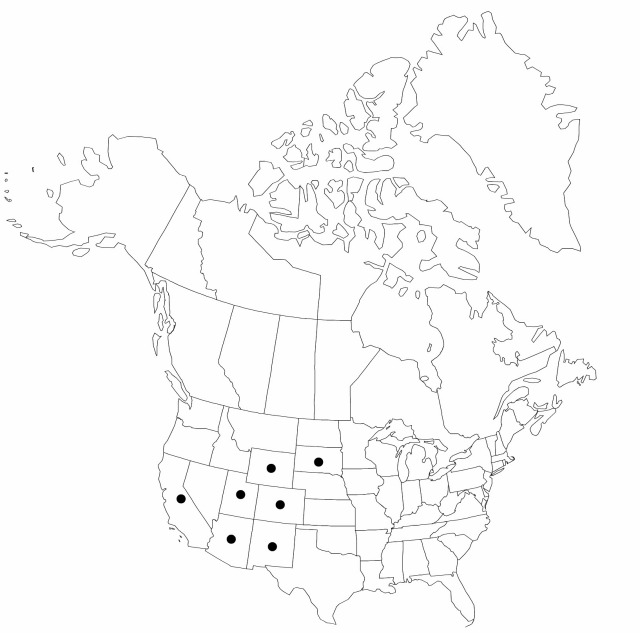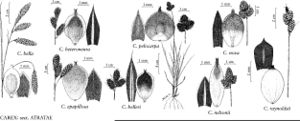Difference between revisions of "Carex bella"
Bot. Gaz. 17: 152. 1892.
FNA>Volume Importer |
imported>Volume Importer |
||
| (3 intermediate revisions by 2 users not shown) | |||
| Line 6: | Line 6: | ||
|place=17: 152. 1892 | |place=17: 152. 1892 | ||
|year=1892 | |year=1892 | ||
| + | }} | ||
| + | |special_status={{Treatment/ID/Special_status | ||
| + | |code=F | ||
| + | |label=Illustrated | ||
}} | }} | ||
|basionyms= | |basionyms= | ||
| Line 11: | Line 15: | ||
|name=Carex atrata var. discolor | |name=Carex atrata var. discolor | ||
|authority=L. H. Bailey | |authority=L. H. Bailey | ||
| + | |rank=variety | ||
}} {{Treatment/ID/Synonym | }} {{Treatment/ID/Synonym | ||
|name=Carex atrata var. discolor | |name=Carex atrata var. discolor | ||
|authority=(L. H. Bailey) Kükenthal | |authority=(L. H. Bailey) Kükenthal | ||
| + | |rank=variety | ||
}} {{Treatment/ID/Synonym | }} {{Treatment/ID/Synonym | ||
|name=Carex uncompahgre | |name=Carex uncompahgre | ||
| − | |authority= | + | |authority= |
| + | |rank=species | ||
}} | }} | ||
|hierarchy=Cyperaceae;Carex;Carex sect. Racemosae;Carex bella | |hierarchy=Cyperaceae;Carex;Carex sect. Racemosae;Carex bella | ||
| Line 40: | Line 47: | ||
-->{{#Taxon: | -->{{#Taxon: | ||
name=Carex bella | name=Carex bella | ||
| − | |||
|authority=L. H. Bailey | |authority=L. H. Bailey | ||
|rank=species | |rank=species | ||
| Line 54: | Line 60: | ||
|publication title=Bot. Gaz. | |publication title=Bot. Gaz. | ||
|publication year=1892 | |publication year=1892 | ||
| − | |special status= | + | |special status=Illustrated |
| − | |source xml=https:// | + | |source xml=https://bitbucket.org/aafc-mbb/fna-data-curation/src/2e0870ddd59836b60bcf96646a41e87ea5a5943a/coarse_grained_fna_xml/V23/V23_740.xml |
|genus=Carex | |genus=Carex | ||
|section=Carex sect. Racemosae | |section=Carex sect. Racemosae | ||
Latest revision as of 21:42, 5 November 2020
Plants cespitose. Culms 25–55 cm, proximally scabrous. Leaves 3–6 mm wide. Inflorescences: proximal bracts shorter than or exceeding inflorescences; spikes pendent, separate, long-pendunculate, elongate, cylindric or clavate, 12–25 × 4–5.5 mm; lateral 2–3 spikes gynecandrous or, rarely, pistillate; terminal spike gynecandrous. Pistillate scales light to dark brown, margins hyaline, lanceolate, shorter than and narrower or as broad as perigynia, midvein lighter colored than body, conspicuous, frequently raised, prominent, apex acute or mucronate. Perigynia ascending, pale green or pale yellow, veinless, elliptic or obovate, 3–4 × 1.75–2 mm, apex abruptly formed, smooth; beak 0.3–0.4 mm, shallowly or deeply bidentate, smooth. Achenes nearly filling body of perigynia. 2n = 40.
Phenology: Fruiting Jun–Aug.
Habitat: Moist subalpine meadows
Elevation: 2800–3900 m
Distribution

Ariz., Calif., Colo., N.Mex., S.Dak., Utah, Wyo., Mexico (Nuevo León).
Discussion
Selected References
None.
